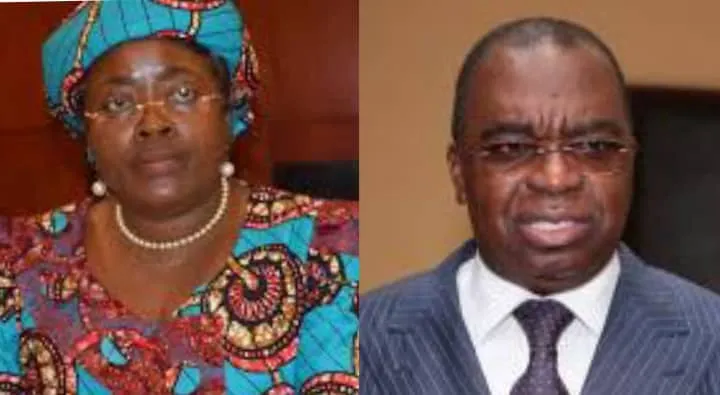Typical of putting the cart before the horse, Cameroon has rolled out the implementation of a phone tax without making plans with telephone companies who are expected to implement its recovery.
Although voted in November 2018 as part of the 2019 finance law, the new digital collection system for customs duties on cell phones and tablets in Cameroon did not go operational from October 15, 2020, as announced by the government.
According to a source at the heart of the matter, the telephone companies have not yet connected to the technical platform that carries the collection solution. This connection is nevertheless essential. But the Ministers of Post & Telecommunications, Libom Li Likeng and Finance, Louis Paul Motaze were quick to announce the implementation of the new law without setting the ground work.
In fact, the technical platform was reportedly developed by Arintech, an entity still unknown until the recent revelation of its name by the authorities. Little is known how the company won such a giant contract.
In order to function, the system needs to be linked to the databases of all the telephone operators in the country. In addition, it is these companies that will now be responsible for collecting these taxes and remitting them monthly to the customs services.
Passage in force
“We can’t connect. Because, we have not even signed a contract with the State yet,” said officials within the top management of several telecom operators approached. According to our information, the government seized, in the middle of last week, the legal officers of telephone services to send them a version of the said contract.
“We have been asked to send our observations within a week. I imagine after that we’ll have a chat. Because, there is no question that we will not sign this contract as it is,” says a senior executive of a mobile phone company.
The Association of Mobile Phone Operators in Cameroon (AOCTM), which is currently chaired by the CEO of Orange Cameroon, Frédéric Debord, should also speak this week with the Cameroonian authorities, to present their long list of grievances against the digital customs duty collection device on phones and tablets, Mimi Mefo Info learned from trusted sources.
“The protocols used here have been the subject of an overall work between the players, namely the Ministry of Post and Telecommunications ( Minpostel), and the regulators (ART and Antic) and the telephone operators,” says Minister Minette Libom Li Likeng. She co-signed with the Minister of Finance, Louis Paul Motaze, the press release announcing the effective implementation of the system.
The concessionaires of mobile telephone services admit to having been in discussions with the authorities since November 2018, on the eve of the sending to Parliament of the 2019 finance law, which introduces the digital collection of customs duties on phones and tablets.
“But, the fundamental questions were never addressed. In addition, several operational issues have not, to date, found concrete technical solutions; which makes it difficult to integrate the expressed needs of the state into our operating systems,” said a senior official at a mobile phone company who prefers not to be named for fear of reprisals.
For the AOCTM, the government’s approach, which has already set 15 October as the date for the operationalization of the device, therefore amounted to a forced passage.
Technical issues
Among the problems that have remained unresolved, our sources cite the complexity of multiple SIM phones, the charges on tablets that connect to the network without the need for a SIM card, the lack of mercurial … “The Directorate General of Customs has not yet determined the list of duties and taxes to be paid according to the range, brand and model of terminal devices. This essential element is not yet part of the proposed technical solution,” maintains a manager.
In response, at the Directorate General of Customs, the decision of the Minister of Finance signed on March 17, 2020 is brandished. This text, which some mobile operators say they ignore, fixes “the minimum taxable values applicable to the import of certain goods”. We learn that for phones and tablets, the assessed value varies from 3,000 FCFA to 200,000 FCFA.
Today, many phones work simultaneously with two or three SIM cards. “How will we be able to detect that the IMEI (International Mobile Equipment Identity) of the dual SIM device belong to the same phone and prevent the user from making multiple payments for the same phone? When the multiple SIM phone connects to different operators through each of its SIMs, which of these operators should collect the tax? Another official wondered. The latter also fears that social peace around the mobile phone industry will be disturbed, because of this potentially conflicting customs duty collection mechanism.
Arintech in question
Paul Zambo is the Chief Executive Officer (CEO) of Arintech, a state agent in the development of the new device for collecting tariffs on mobile phones and tablets. According to the platform gathers or will gather all the data of all the telephone operators in Cameroon” and uses a “very efficient triangulation system”, to solve the problems of the phone type with multiple SIM or duplication of IMEI.
As guest of the program “Press scene” on the government television CRTV, on October 11, 2020, the latter nevertheless admitted that this technology is not 100% secure.
He also had difficulty in clearly describing what type of data would be useful to make his application work. On the security and confidentiality of personal data, the promoter of Arintech has given as sole guarantee “compliance with the specifications” set for it by the State, thus reinforcing all the reservations that certain operators have of its platform and of his company, whose service records are nowhere visible.
“In fact, Arintech is similar to a shrouded-in-doubts venture led by a certain Paul Zambo, better known as the national president of the political party called the Movement for the Integral Development of the Republic (MDIR), formerly engaged in the rental activity of planes”, we heard in the corridors of a multinational telecoms company.
The CEO of Arintech describes himself as an “inventor”. According to him, his project would have been selected in competitions organized by the Ministry of Post and Telecommunications, such as “Digital Innovation Week” and incubated in the same environment.
Threat to turnover
The new system for collecting customs duties on telephones and tablets provides for payment of these taxes by communication credit. The regularity of this mechanism is also of concern to certain telephone operators, who have reportedly seized the governor of the Bank of Central African States (BEAC), responsible for monetary policy in the Cemac zone. The question is whether the communication credit can be used as a means of payment.
While awaiting the response from Abbas Mahamat Tolli, the governor of this central bank, experts within this institution judge the process to be contrary to Community regulations. Because it would thus make telephone companies creators of money, a prerogative for the moment reserved for BEAC, commercial banks and public treasuries of CEMAC member states – Cameroon, Congo, Gabon, Chad, Equatorial Guinea and the Central African Republic.
But above all, what the AOCTM fears the most is the impact of this payment mechanism on the turnover of the mobile telephone industry. “The levy of customs duties and taxes on communication credit would oblige mobile telephone companies to share with customs the part of the wallet that the consumer reserves for the purchase of Airtime,” worries a member of this association defending the interests of operators.
Through this reform, the Customs plans to multiply the revenue generated by customs duties on phones and tablets by 2,500%, to reach FCFA 25 billion in the first year of implementation. “The additional revenue hoped for each year by customs represent as much revenue lost by a mobile telephone industry, which is already going through a deep economic crisis”, plague one in the top management of telephone companies. The state plans to devote 1.65% of the revenue collected by this new system to remunerate all intermediaries (Arintech, telephone companies, etc.), or around FCFA 300 million for the first year.
Consumers have been at a loss, given that aside from the 19.5% value-added tax (VAT), consumers have to pay an additional 33% as phone tax, a commercial tax that should ordinarily not be paid by consumers.
But for a country that produces fuel and rice but at the same time subsidizes imports for these, it is shocking that they would choose to tax phones they cannot even assemble, talk less of producing.
READ MORE ON THE TOPIC: https://mimimefoinfos.com/cameroons-controversial-phone-tax-digitisation-or-deceit/
It goes without say that the war in Cameroon’s North West and South West Regions has drained state coffers to the point where government is gasping for breath. But would a sincere dialogue not avoid this hardship?
Mimi Mefo Info Editorial .





